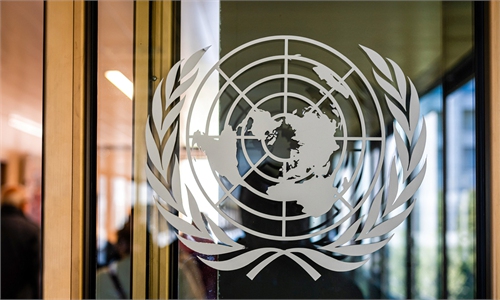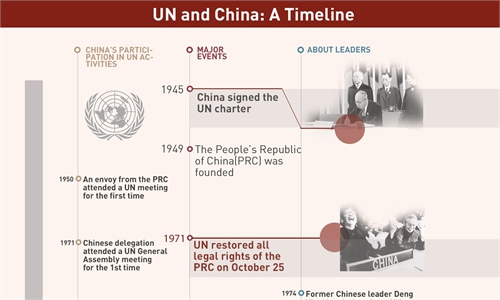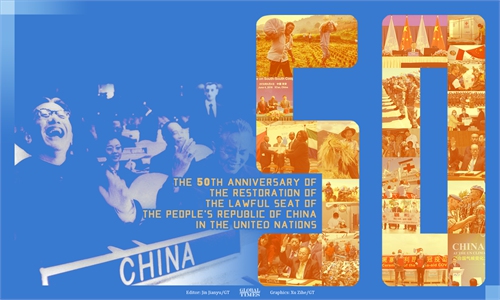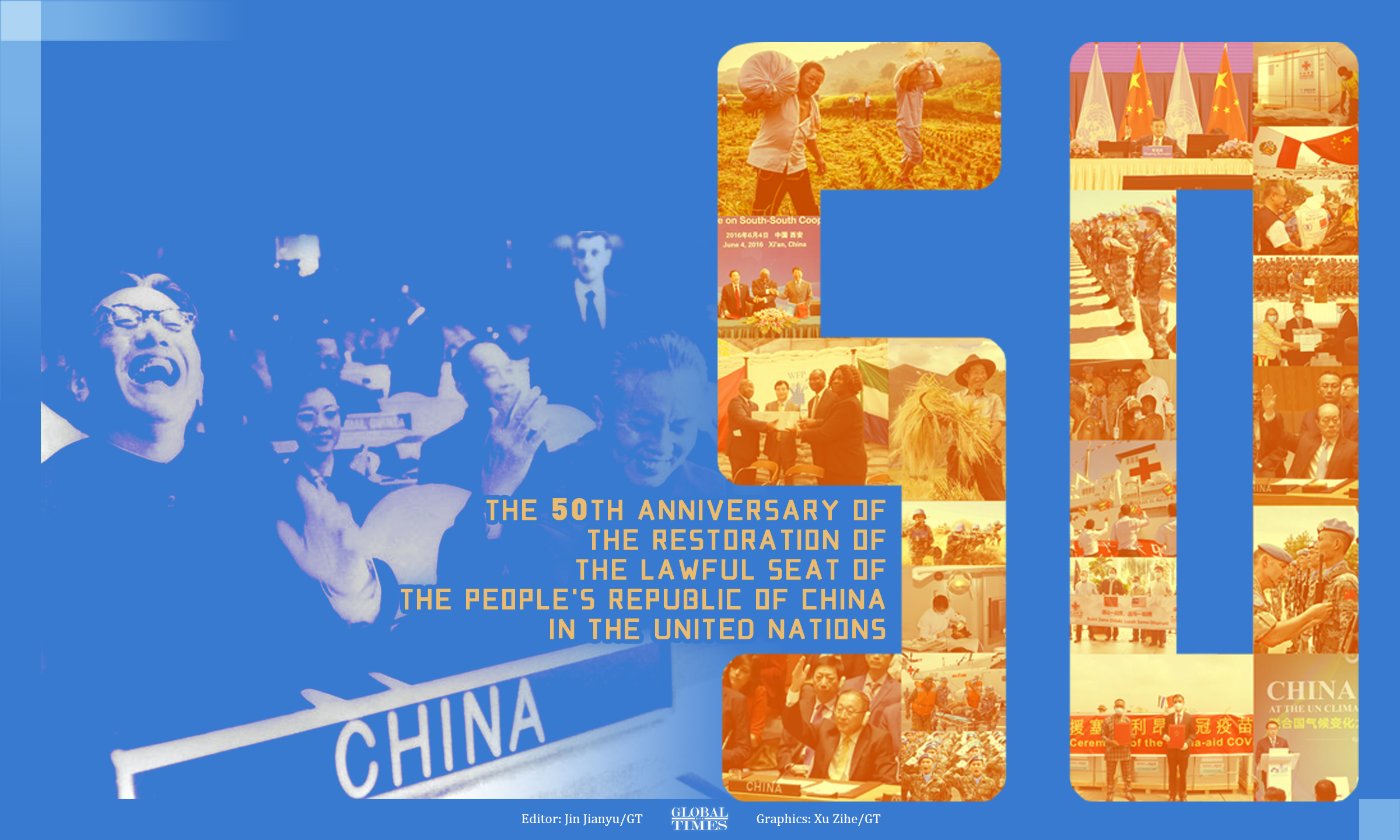
2021 marks the 50th anniversary of the restoration of the lawful seat of the People's Republic of China in the UN. These five decades have witnessed China's practice of multilateralism, full participation in and support for the cause of the UN. Graphic: Jin Jianyu and Xu Zihe/Global Times
The Chinese Foreign Ministry released a position paper on China's cooperation with the United Nations on Friday in the run up to the 50th anniversary of the restoration of the lawful seat of the People's Republic of China in the UN, stressing that China opposes unilateralism, protectionism and bullying acts and rejects pseudo-multilateralism like group politics and small circles while upholding multilateralism, and China will firmly follow the path of peaceful development and never seek hegemony, expansion or spheres of influence.
Chinese analysts and former envoys said China's cooperation with the UN in the past 50 years, which enhanced the UN's authority in global affairs, represented the future direction of the world, as more and more countries have been supporting China's practice of peaceful coexistence and safeguarding fairness and justice, while resisting the US-led Western hegemony and kidnapping of the UN for their selfish purposes and creating confrontations.
The Position Paper on China's Cooperation with the United Nations set forth China's position on major international issues such as upholding multilateralism, promoting global development and jointly tackling the pandemic. It was released as the country observes its 50th anniversary of UN seat restoration, and amid louder voices from the international society in upholding multilateralism to jointly respond to common challenges, the Chinese Foreign Ministry said.
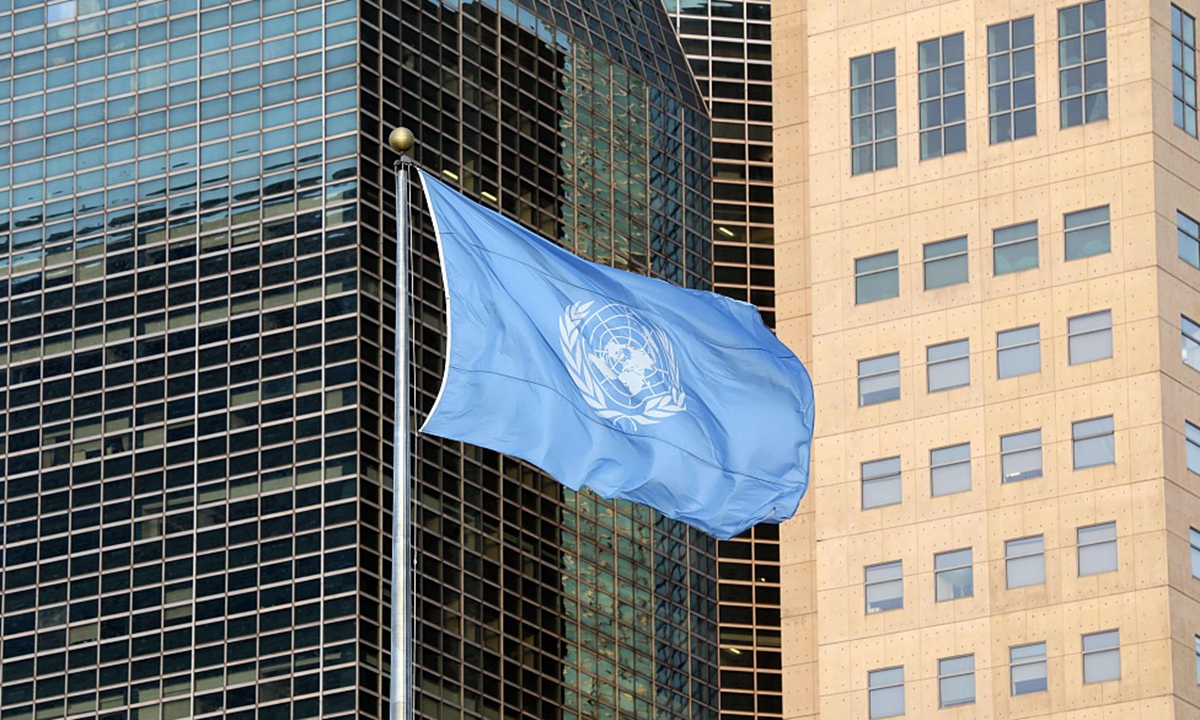
Photo:VCG
Over the past 50 years, China has firmly upheld world peace and security. China has been committed to an objective and just position, to resolving differences through dialogue and consultations, and to the principle of non-interference in each others' internal affairs. China firmly opposes the willful threat or use of force in international affairs, the paper said.
China has also made vigorous efforts to promote global development, and has met the poverty eradication target of the 2030 Agenda for Sustainable Development 10 years ahead of schedule.
China has firmly upheld the international order underpinned by international law, and fully supported the UN in playing a central role in international affairs.
On October 25, 1971, the 26th UN General Assembly adopted Resolution 2758 with an overwhelming majority of votes, restoring all the lawful rights of the People's Republic of China at the UN and recognizing the representatives of its government as the only legitimate representative of China at the UN.
China will organize a conference marking the 50th anniversary of the restoration of its lawful seat in the UN in Beijing on Monday, and President Xi Jinping will attend the conference and deliver important remarks. UN Secretary-General Antonio Guterres, foreign diplomats and representatives of international organizations will also attend the conference on site or via video, Zhao Lijian, spokesperson of the Chinese Foreign Ministry, said at Friday's media briefing.
The past 50 years were the golden 50 years for close coordination and cooperation between China and the UN which has not only smoothened relations between China and other countries, but also enhanced the authority of the UN which has been undermined by the US' Cold War mentality and hegemony, analysts said.
Chinese analysts said that China's international reputation as well as the UN's reputation in resolving international disputes were enhanced with deepened cooperation between China and UN, and China's concept of seeking cooperation, upholding multilateralism and acting as a responsible major country has enabled the UN to take more initiative and show more inclusiveness in dealing with global issues of security, climate change, and health.
The fruits of cooperation between China and the UN have enabled the world, especially developing countries, to recognize and support China, a country with a socialist system established under the leadership of the Communist Party of China (CPC), and witness the leadership of the CPC, analysts said, as this year also marks the 100th anniversary of the founding of the CPC.
They believe the key for China's domestic development in poverty alleviation, human rights and other issues, as well as its enhanced international status, is upholding the leadership of the CPC.
China under the leadership of the CPC is committed to the path of peaceful development, which provides great stability amid the uncertain international situation, analysts said.
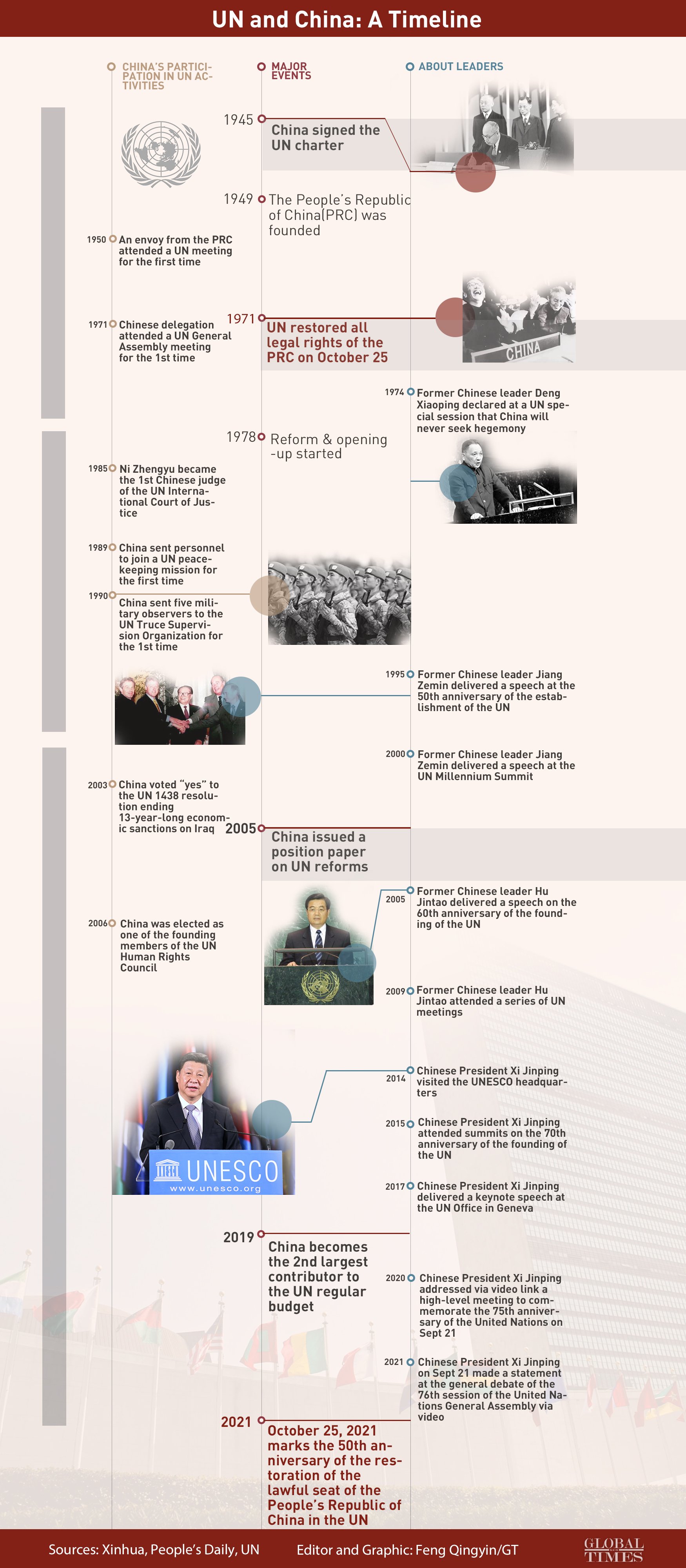
UN and China: A Timeline Graphic:GT
True vs pseudo-multilateralism
Yang Xiyu, former head of the Chinese Foreign Ministry's Office of Korean Peninsula issues, cited China's dealing with the Korean Peninsula nuclear issue. He said that China upheld justice and international law to resolutely oppose North Korea's nuclear weapon tests. But when the US arbitrarily used excessive sanctions to pressure North Korea and even incited regional tensions, China, through multilateral platforms such as the UN, actively engaged in mediation to promote peace talks and ease tensions.
Hua Liming, former Chinese ambassador to Iran, UAE and the Netherlands, told the Global Times that the paper highlighted true multilateralism while opposing unilateralism, as the US-led West has been intensifying its moves in forming cliques, such as the Quad, based on ideology and geopolitics, which has seriously undermined the UN's authority. The West set up barriers for multilateral diplomacy and created instability.
The US' understanding and practices of multilateralism are hegemony - doing what it wants, coercing other countries and even the UN - to serve US interests, attacking countries that do not obey it. The US never believes in or practices multilateralism, Zhang Dan, vice president and director-general of the UN Association of China, told the Global Times.
In a recent move, the US built a new military bloc - AUKUS - with the UK and Australia that heightened geopolitical tensions and triggered outrage from countries in Asia and Europe, including China. Many criticized the US for escalating an arms race and bringing instability.
When some countries yield to the US and dare not express different voices in multilateral platforms, China bravely spoke out against US hegemony and Cold War mentality to safeguard fairness and justice, which has seen more from the international community lean toward China's position on global affairs.
China's stance on political security, human rights and development has gained acceptance among UN members as they have been made based on UN principles and represented the stance of the majority of developing countries, Zhang said.
"The cooperation between China and the UN represents the future direction of the world with peaceful coexistence and cooperation, and the US' hegemonic policy will be isolated," Hua said.
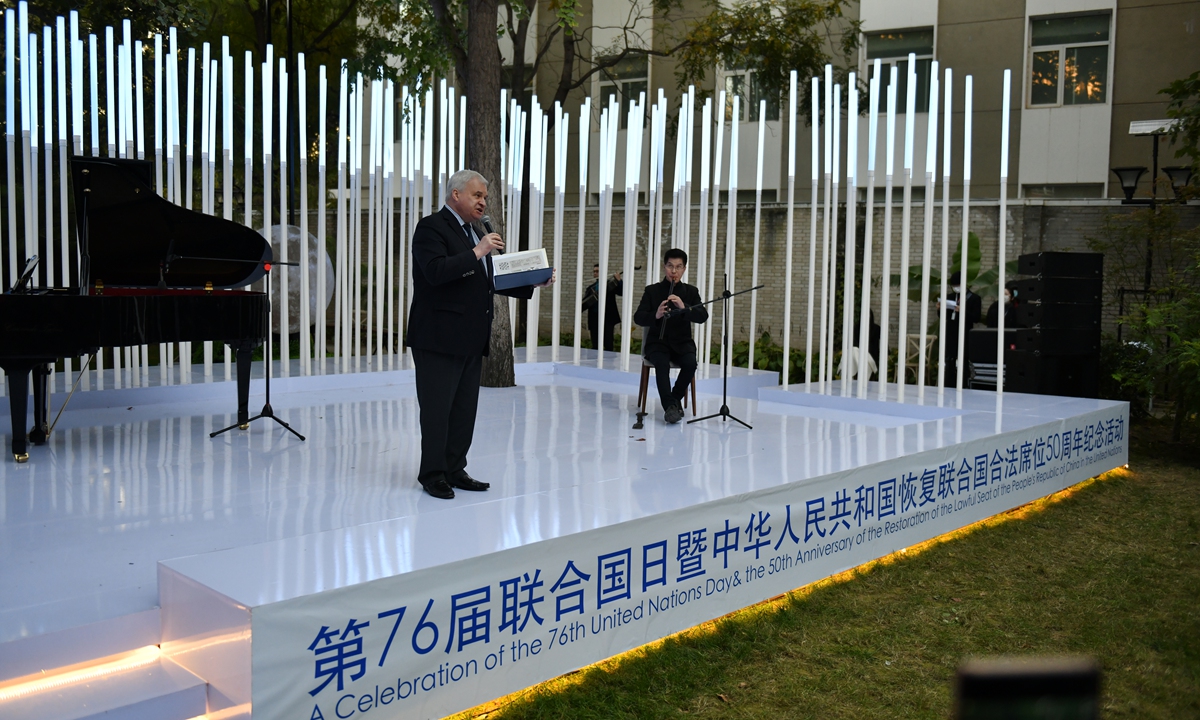
Russian Ambassador to China Andrey Denisov reads a poem to celebrate the 76th UN Day and 50th anniversary of the restoration of the lawful seat of the People's Republic of China in the UN in Beijing on Friday. Photo: VCG
Human rights
Over the past 50 years, China's biggest contributions to the UN were concrete actions to defend the UN's authority and keep multilateralism alive. China's efforts on human rights are a good example of how it defends the UN's multilateralism, Mao Junxiang, executive director and professor at the Human Rights Studies Center at Central South University, told the Global Times.
Since the resumption of its legitimate seat in the UN in 1971, China has been participating in human rights discussions at the UN General Assembly and the Economic and Social Council (ECOSOC). China attended the Human Rights Commission as an observer for three consecutive years since 1979 until it was elected a member state of the Commission at the first regular session of ECOSOC in 1981 and has since remained. China has sent delegations to every session of the Commission since 1982.
China's firm support for the UN's human rights mechanism is manifested in many ways, including joining more than 20 international treaties, fulfilling related obligations and making domestic laws and regulations, Mao noted.
China also played an important role in the building of the Human Rights Council, Mao said, noting that many of China's proposals, including insisting on replacing political confrontations with objective and non-political reviews on countries' human rights record, have been included in the mechanism building of the Human Rights Council.
China's ideas and practices on human rights have also helped enrich the UN's human rights mechanism. Building a community with a shared future for mankind has been included in some resolutions of the Human Rights Council, Mao noted.
According to the position paper released on Friday, under the leadership of the Communist Party of China, China has successfully developed a path of human rights development that suits China's national reality and needs and has the support of the Chinese people.
Different from the West and the US, which interpret human rights as political rights, including freedom of speech, China and most developing countries focus more on their right to develop. This is also the biggest divergence between developed and developing countries, experts noted.
China has always been a positive force on human rights. Together with more developing countries, China urged more seats for developing countries in the international mechanism on human rights to break the dominance of the West on human rights issues, Mao said, noting that promoting the strength of developing countries is also the way to promote the UN's fairness and justice.

2021 marks the 50th anniversary of the restoration of the lawful seat of the People's Republic of China in the UN. These five decades have witnessed China's practice of multilateralism, full participation in and support for the cause of the UN. Graphic: Jin Jianyu and Xu Zihe/Global Times
The Chinese Foreign Ministry released a position paper on China's cooperation with the United Nations on Friday in the run up to the 50th anniversary of the restoration of the lawful seat of the People's Republic of China in the UN, stressing that China opposes unilateralism, protectionism and bullying acts and rejects pseudo-multilateralism like group politics and small circles while upholding multilateralism, and China will firmly follow the path of peaceful development and never seek hegemony, expansion or spheres of influence.
Chinese analysts and former envoys said China's cooperation with the UN in the past 50 years, which enhanced the UN's authority in global affairs, represented the future direction of the world, as more and more countries have been supporting China's practice of peaceful coexistence and safeguarding fairness and justice, while resisting the US-led Western hegemony and kidnapping of the UN for their selfish purposes and creating confrontations.
The Position Paper on China's Cooperation with the United Nations set forth China's position on major international issues such as upholding multilateralism, promoting global development and jointly tackling the pandemic. It was released as the country observes its 50th anniversary of UN seat restoration, and amid louder voices from the international society in upholding multilateralism to jointly respond to common challenges, the Chinese Foreign Ministry said.

Photo:VCG
Over the past 50 years, China has firmly upheld world peace and security. China has been committed to an objective and just position, to resolving differences through dialogue and consultations, and to the principle of non-interference in each others' internal affairs. China firmly opposes the willful threat or use of force in international affairs, the paper said.
China has also made vigorous efforts to promote global development, and has met the poverty eradication target of the 2030 Agenda for Sustainable Development 10 years ahead of schedule.
China has firmly upheld the international order underpinned by international law, and fully supported the UN in playing a central role in international affairs.
On October 25, 1971, the 26th UN General Assembly adopted Resolution 2758 with an overwhelming majority of votes, restoring all the lawful rights of the People's Republic of China at the UN and recognizing the representatives of its government as the only legitimate representative of China at the UN.
China will organize a conference marking the 50th anniversary of the restoration of its lawful seat in the UN in Beijing on Monday, and President Xi Jinping will attend the conference and deliver important remarks. UN Secretary-General Antonio Guterres, foreign diplomats and representatives of international organizations will also attend the conference on site or via video, Zhao Lijian, spokesperson of the Chinese Foreign Ministry, said at Friday's media briefing.
The past 50 years were the golden 50 years for close coordination and cooperation between China and the UN which has not only smoothened relations between China and other countries, but also enhanced the authority of the UN which has been undermined by the US' Cold War mentality and hegemony, analysts said.
Chinese analysts said that China's international reputation as well as the UN's reputation in resolving international disputes were enhanced with deepened cooperation between China and UN, and China's concept of seeking cooperation, upholding multilateralism and acting as a responsible major country has enabled the UN to take more initiative and show more inclusiveness in dealing with global issues of security, climate change, and health.
The fruits of cooperation between China and the UN have enabled the world, especially developing countries, to recognize and support China, a country with a socialist system established under the leadership of the Communist Party of China (CPC), and witness the leadership of the CPC, analysts said, as this year also marks the 100th anniversary of the founding of the CPC.
They believe the key for China's domestic development in poverty alleviation, human rights and other issues, as well as its enhanced international status, is upholding the leadership of the CPC.
China under the leadership of the CPC is committed to the path of peaceful development, which provides great stability amid the uncertain international situation, analysts said.

UN and China: A Timeline Graphic:GT
True vs pseudo-multilateralism
Yang Xiyu, former head of the Chinese Foreign Ministry's Office of Korean Peninsula issues, cited China's dealing with the Korean Peninsula nuclear issue. He said that China upheld justice and international law to resolutely oppose North Korea's nuclear weapon tests. But when the US arbitrarily used excessive sanctions to pressure North Korea and even incited regional tensions, China, through multilateral platforms such as the UN, actively engaged in mediation to promote peace talks and ease tensions.
Hua Liming, former Chinese ambassador to Iran, UAE and the Netherlands, told the Global Times that the paper highlighted true multilateralism while opposing unilateralism, as the US-led West has been intensifying its moves in forming cliques, such as the Quad, based on ideology and geopolitics, which has seriously undermined the UN's authority. The West set up barriers for multilateral diplomacy and created instability.
The US' understanding and practices of multilateralism are hegemony - doing what it wants, coercing other countries and even the UN - to serve US interests, attacking countries that do not obey it. The US never believes in or practices multilateralism, Zhang Dan, vice president and director-general of the UN Association of China, told the Global Times.
In a recent move, the US built a new military bloc - AUKUS - with the UK and Australia that heightened geopolitical tensions and triggered outrage from countries in Asia and Europe, including China. Many criticized the US for escalating an arms race and bringing instability.
When some countries yield to the US and dare not express different voices in multilateral platforms, China bravely spoke out against US hegemony and Cold War mentality to safeguard fairness and justice, which has seen more from the international community lean toward China's position on global affairs.
China's stance on political security, human rights and development has gained acceptance among UN members as they have been made based on UN principles and represented the stance of the majority of developing countries, Zhang said.
"The cooperation between China and the UN represents the future direction of the world with peaceful coexistence and cooperation, and the US' hegemonic policy will be isolated," Hua said.

Russian Ambassador to China Andrey Denisov reads a poem to celebrate the 76th UN Day and 50th anniversary of the restoration of the lawful seat of the People's Republic of China in the UN in Beijing on Friday. Photo: VCG
Human rights
Over the past 50 years, China's biggest contributions to the UN were concrete actions to defend the UN's authority and keep multilateralism alive. China's efforts on human rights are a good example of how it defends the UN's multilateralism, Mao Junxiang, executive director and professor at the Human Rights Studies Center at Central South University, told the Global Times.
Since the resumption of its legitimate seat in the UN in 1971, China has been participating in human rights discussions at the UN General Assembly and the Economic and Social Council (ECOSOC). China attended the Human Rights Commission as an observer for three consecutive years since 1979 until it was elected a member state of the Commission at the first regular session of ECOSOC in 1981 and has since remained. China has sent delegations to every session of the Commission since 1982.
China's firm support for the UN's human rights mechanism is manifested in many ways, including joining more than 20 international treaties, fulfilling related obligations and making domestic laws and regulations, Mao noted.
China also played an important role in the building of the Human Rights Council, Mao said, noting that many of China's proposals, including insisting on replacing political confrontations with objective and non-political reviews on countries' human rights record, have been included in the mechanism building of the Human Rights Council.
China's ideas and practices on human rights have also helped enrich the UN's human rights mechanism. Building a community with a shared future for mankind has been included in some resolutions of the Human Rights Council, Mao noted.
According to the position paper released on Friday, under the leadership of the Communist Party of China, China has successfully developed a path of human rights development that suits China's national reality and needs and has the support of the Chinese people.
Different from the West and the US, which interpret human rights as political rights, including freedom of speech, China and most developing countries focus more on their right to develop. This is also the biggest divergence between developed and developing countries, experts noted.
China has always been a positive force on human rights. Together with more developing countries, China urged more seats for developing countries in the international mechanism on human rights to break the dominance of the West on human rights issues, Mao said, noting that promoting the strength of developing countries is also the way to promote the UN's fairness and justice.
